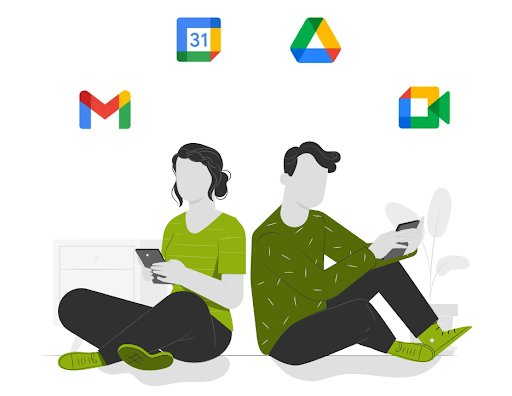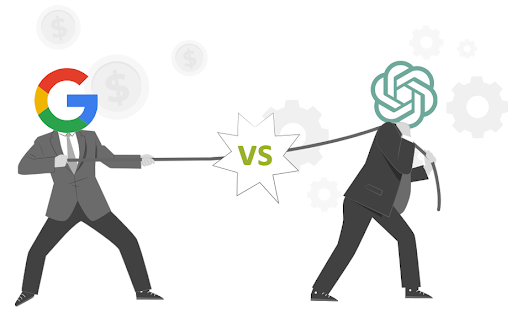What could Google possibly know about us? And will this information be enough to win the AI war? Here’s an insight we’d like to share.
What does Google know?
First and foremost, we are by no means experts in AI. We do however have access to information that not everyone is privy to. Let’s examine what Google really is at its core. In layman’s terms, it’s a search engine. It started as a search engine and it is essentially referred to as a search engine. This however is quite a myopic view of Google. If we think about the information that’s being offered by Google every time we search, it’s insane.

Google knows what you are looking for, what you’re afraid of, and what you’re interested in learning. More to the point, Google knows what you don’t know. It knows your knowledge graph. It knows where you’re ignorant, it knows your prejudices. It knows your echo chamber and your confirmation bias.
An unbelievable and potentially very damaging database of information is being collected on every single person who engages with Google search. Think about all the things that you ask Google, and then think about what those things mean, and then extrapolate that in a way that a machine learning mechanism would be able to.
What do you ask Google?
Let’s say your question to Google is ‘Does missing a mortgage payment hurt my credit?’
Now, think about all the ways Google can interpret that. Are you worried about a job loss? Are you concerned about a potential divorce? The likelihood you’re having money problems is high. Combine that with some of the other things that Google has access to. Those dots begin to connect and create a network of information that’s used to advertise to you.
That’s not the only thing it’s used for, and this is the point that we’re trying to make.
What conversations do you have with YouTube?

Google is not just a search engine because it’s also YouTube. This is the largest video repository on the planet. It is also the second-largest search engine in existence. Since Google has YouTube and that’s like having Google search, Google has information on you, on how you emote, what you want to learn, what music you listen to, where you sit politically, and what makes you angry. Are you running inside YouTube and commenting on things? Well, Google’s cataloging the temperament attached to specific comments and what they might potentially mean.
Then there’s Gmail
Google has the largest email utility in existence, which is also turning into one of the largest enterprise email utilities. And every single email you send and receive is being read by Google. Don’t use Gmail? It doesn’t matter. You communicate with people who do and that means Google’s cataloging the way you speak, your semantic index, and the adjectives and adverbs that appeal to you the most.
Every attachment you send inside of Gmail is fair game, which means all of your taxes and tax information, massively private, like medical documents and everything that you have inside of Gmail, Google reads and then appends to your user. The picture of a person is being formed.
But wait, there’s more

Google Apps. It’s Google Drive, Google Docs, Google Photos, Google Slides, and Google Sheets. Google knows your net worth. They know what your tax filing looks like. They know what your children look like. Take a look at Google Photos. Think about everything that you have inside of Google Drive right now. Google can use that information. And it explains the unbelievable plethora of free services. Google Calendar knows exactly what you do when you do it, how you do it, at what frequencies, at what intervals, and when it repeats. Then there’s Google Maps.
Everybody’s got Google in their pocket. Google knows where you go, where you live, where your kids go to school, and how fast you drive. It takes 30 minutes to get from point A to point B, but you got there in 25. So you get car insurance ads. It’s also Android. Google owns the largest operating system in the world.
Don’t use Android, you’re an iPhone user? That’s ok. You communicate with people that use Android. Google knows who you call, who calls you, who you text, who you ignore, what you say, what you download, and what apps you’re using. What about Chrome? It’s a browser. Everything you’ve ever typed into that browser, everything you’ve ever logged into, everything you’ve ever done, when you logged in, and when you go to your bank account. Google gets to see all of that, but it’s not just Chrome. It’s also Google Analytics.
It knows you better than you know yourself
Google Analytics exists on 90% of all known websites, effectively adjusted for margin of error. It is the most prolific thing on the internet. It knows every website that you’ve gone to, everything you’ve done on those websites, and how long you were there. Let’s get really uncomfortable for a minute. Google knows who’s in Narcotics Anonymous, who’s cheating on their spouse, who’s about to declare bankruptcy, who’s going to get a divorce, and what kind of porn you watch.
Google knows everything about you. In a popular case study published in April of 2015, “Google told me I’m pregnant,” Google told a woman she was pregnant before she knew she was, based solely on her search and communication patterns.
Moore’s Law says that machine computing power doubles every 18 months. So from 2015 to today, what could Google possibly know about us now? This is the point that we’re trying to make.
AI at work
This is why we think Google wins the AI battle. AI developers don’t really know how AI works. And they’ve said that overtly. Enough of them have said it to accept it as truth. They’ve built a digitized neural network. They offer inputs with trained outputs, which then allow the neural network to learn. The simplest, most benign example is one where images of men and women were shown to the AI mechanism.
A human told the bot when an image was a man and when an image was a woman, and over time the machine was able to identify men and women by using its own knowledge graph. It’s not a software program that simply says when somebody has long hair they identify as a woman.
After seeing tens of thousands of images of men and women the machine paid attention and built hundreds of thousands of common denominators such as cheekbones, jaw structure, skin tone, height, shoulder width, and so on. It goes on to build its own thought process around assigning value.
AI’s power exists upon the core premise of being trained. Everybody in the AI game talks about it. Midjourney lost its footing because it used hundreds of thousands of images that it didn’t necessarily have the rights to use. The ethical question is: Are images being plagiarized? Or are we plugging these images into a network that’s using them to learn how to create subsequent images? Where exactly does IP begin and end?
The unknown path of AI
Information that’s being used to train the AI is the most important variable for now. Google has better information and more information on everybody, and they’ve been collecting it for decades. There are a few close runners-up. Apple, for example. If you think about what Apple has from an infrastructure standpoint, they have a lot of data on you. And, potentially Amazon because of Amazon’s web services and everything it hosts.
Open AI focuses its training on open-source libraries. Google’s data set is better than anybody’s. You could combine every government on the planet with all the Big Brother’s watch programs and you still wouldn’t have something comparable to the Google propriety data set.
How much can they see and catalog? Probably all of it. Nobody has done it as well or grafted it as well as Google. And we know that because we see the way Google Ads works: It intrinsically qualifies the storage mechanism that Google has, making it the frontrunner for AI.
Why is Google hanging back when it comes to AI?

Google didn’t want to take the hit of AI arrows in the first wave. Not being first to market was an intelligent decision because they had way more to lose than what is effectively a nonprofit app that’s iterative in nature. The folks behind ChatGPT could afford to be. They’re young and nimble and bold.
Google had way more to lose. It looks like Google’s behind but in the long run that’s probably not the case. What’s more, they have the building blocks necessary to make it work. Up to now, we’ve been focusing on what Google knows about you. Stop and think about what Google knows in general!
Google has cataloged the internet better and more effectively than anybody else has ever cataloged the internet: the lexicon of the world’s knowledge, our intellectual library, and humanity’s brain, to name a few. Their number-one unique selling proposition is they have graphed knowledge better than anybody.
Your guess is as good as ours
It’s difficult to view a future where Google isn’t the frontrunner in the race that is AI. We’re open to being challenged on that. We want to learn and know if there’s something we don’t know, for instance, is there somebody out there that has a better or at least competitive database of information?
Author
Patience is the former director of marketing and communications for Solutions 8. A phenomenal content writer, copywriter, editor, and marketer, she has played a prominent role in helping Solutions 8 become an authority in the Google Ads space. Patience is also the co-author of The Ultimate Guide to Choosing the Best Google Ads Agency and You vs Google.
 Patience Hurlburt-Lawton
Patience Hurlburt-Lawton

